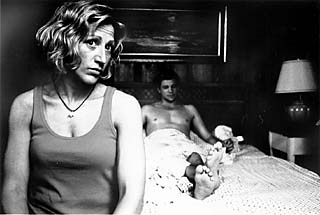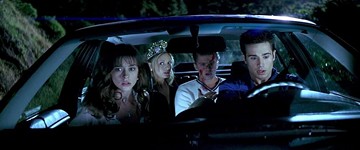Here Comes the Sun
Limelight looks good on actress Edie Falco
By Marrit Ingman, Fri., Aug. 2, 2002

HBO viewers know her best as well-manicured Mafia wife Carmela Soprano, a role for which she has won two Emmys, or as officer Diane Whittlesey from Oz. But character actress Edie Falco has made her mark in a number of distinguished, if lesser-seen, ensemble pieces: films by Nick Gomez and fellow Long Islander Hal Hartley, and a star turn in 1999's indie award-winner Judy Berlin -- by all rights, a career-making performance in itself.
In her current film, John Sayles' epic social drama Sunshine State, Falco heads an all-star cast as Marly Temple, an alcoholic, thirtysomething business owner (and former Weeki Wachee mermaid) poised between rapacious land developers and recalcitrant locals in a heated public battle over land in a small town on the Florida coast. Like her character, Falco is in the limelight -- but it hasn't happened suddenly.
In a phone call from Manhattan, where she is rehearsing for Terrence McNally's Frankie and Johnny in the Clair de Lune on Broadway, Falco described her curious career and life with Sayles.
Austin Chronicle: I've heard that John Sayles cast you after he saw you in Judy Berlin. I'm interested in whether you had a hand in creating your character.
Edie Falco: Yeah. I didn't know that until sort of recently, actually. Well, I think I had the same hand in creating it that I always do, which is that I've got the words that he's written, and I've got what I know about her, which is that she's a local from this area of Florida, and beyond that, whatever happens happens, and she's sort of formed from that.
AC: [A dog barks audibly.] Is that your dog?
EF: [laughs] That's my dog.
AC: I understand that your dog has the same name as your character.
EF: How about that? It was completely coincidental. I was lucky enough to have gotten a letter from John Sayles saying, "I would love it if you would consider playing the part of Marly." And I thought he was kidding. I don't know. I actually thought it was a joke.
AC: And your mom being in community theatre -- was that another coincidence?
EF: That is, actually, yes. It actually is. The difference is that I was completely mesmerized by it as a kid, and I think Marly is less so.
AC: What was it like working with such a marvelous ensemble [which includes Angela Bassett, Bill Cobbs, Timothy Hutton, Alan King, and Mary Steenburgen]?
EF: Well, it was a little bit like I kept waiting for someone to tap me on the shoulder and tell me I wasn't supposed to be there. You know, these are people I had looked up to for years, whom I'd been inspired by, and who, for the most part, had been hugely famous for the years that I'd been in New York working in lesser-known things. The fact that I was suddenly considered on a par with these people was, you know, a little bit of a milestone. And I'll tell you, it really makes the whole thing so much more fun, because what you really are doing is kind of playing. And to get to play with people who are just so good at it, who've been around the block a few times and who know what they're doing -- it really doesn't get much better than that.
AC: Was it really "Camp Sayles"?
EF: [laughs] It really was, yes! It was breathtaking being where we were. We were on the water there in Florida, and you couldn't help but notice our surroundings, especially since most of us live in Manhattan -- well, a lot of us did. And then you find yourself in the warmth, on the water, and we couldn't help but take advantage of it. So we spent a lot of time swimming and barbecuing and, you know, playing volleyball and tennis and softball. It was ridiculously fun.
AC: You seem to have always been a part of really strong ensembles, even in the smaller indie movies -- the Hartley actors, Judy Berlin's Madeline Kahn and Barbara Barrie. What's that been like?
EF: I can't imagine anything better than that, you know? We're all here to tell a story, a story that originated with the filmmaker or the playwright, or whatever, and if you had a lot of really strong people with their own stuff to bring to the project, to help tell the story, I can't imagine what would be better than that. I don't know what else there is, other than star vehicles, which are of absolutely no interest to me.
AC: It seems like your career is having an unusual trajectory, now that you're becoming more of the center of these ensembles.
EF: I guess. I don't think of myself that way. But, you know, television is an interesting thing. Everybody has it, you know what I mean? So to have been working all the years that I've been working, and then get on a television show that a lot of people are watching, it is incredible how many people all of a sudden are aware of your existence. When in fact my life is pretty much the same, you know, I'm working with great actors, I'm inspired by great actors and directors. I mean, all that stuff has remained somewhat constant. People are going to do with me, in their minds, whatever they're going to do with me, and it has nothing to do with me really.
AC: I had read that you were surprised by being cast in The Sopranos.
EF: Oh, yeah. You know, there's a television show that's going to be made, and they're looking for the part of a mob wife, an Italian mob wife. I have to say, I might have been the last person I would have thought of for that role. There was no question in my mind that I could do it, and that I knew who this character was, but you think television, and you think, OK, they're going to get someone who is physically more appropriate for it. I pictured dark hair, dark skin, lives in Brooklyn, I don't know. For the most part, casting for television is not all that risky. I just never thought there was a chance in hell they'd actually think of me for it.
AC: How did that feel?
EF: Oh, it felt great. As soon as I was cast, I realized this was not par for the course here, with television. There must be something different about this show. From that point on, that has proven to be the case.
AC: You know, I'm struck by how so many of the characters you've played -- and Frankie and Johnny is no exception -- have seemed to be in the second acts of their lives.
EF: That's interesting. Well, I'd always been told as a kid that I wasn't an ingénue, you know. I was a late bloomer, and all these words and phrases had been thrown at me since I was a little kid. The truth is, when I was in my 20s and stuff, I'd always played older than myself. And that's not where I am at all. I'm actually just coming into my life, kind of, but I'm getting to play characters who are ahead of me, heading into their second chapter. That's always been the case with me. I think I've always looked older than I am, always felt older than I am.
AC: Do you relate to Marly?
EF: You know what, I absolutely could. It's kind of like she was my alter ego. There are many ways that I easily could have become her. There are a lot of women I went to high school with who were still living in the town. The difference is a lot of them are married and have kids, and now are thinking, "God, I wish I had done something else." You know, I'm running into a lot of women I knew who say, "If there's ever a small part on something ..." And it makes me a little sad, although I'm sure they're happy with the lives that they've chosen. But there's always that question, "I could have done ..." But the difference between Marly and me is that I always had one thing in mind, and that's where I've headed. I had no other options, truly. Nothing else seemed interesting to me. I'm living the life I've always dreamt of. ![]()
Sunshine State opens in theatres on Friday. See Film Listings for review.










